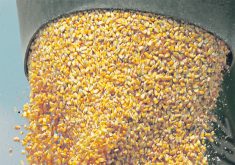Four months after a high tariff effectively shut American corn out of Western Canada, supplies began to trickle in again last week.
On March 7, a tribunal examining corn trade in Western Canada lifted the tariff after ruling subsidized American corn has not injured Manitoba corn growers.
The ruling came as a shock to supporters and opponents of the trade action launched by the corn growers last summer.
Michael Coates, the president of the Manitoba Corn Growers Association, said he was “outraged” by the decision.
Read Also

Chinese, Indian tariffs take toll on pea prices
The disruption of pea exports from Canada’s largest customers will likely result in slow pea exports for the remainder of the crop year.
“I just can’t understand why the injury ruling wasn’t in our favor, because it’s obvious there was injury,” said Coates, the morning after learning of the decision.
The Canadian International Trade Tribunal listened to testimony Feb.
5-9 about whether farmers were injured by growing imports of corn from the United States. Reasons for the decision will be available by March 22.
During the hearings, opponents of the duty pointed out Manitoba farmers have increased corn production and grown their market share in Western Canada. They questioned how farmers could accomplish this if the imports of U.S. corn truly caused injury.
Opponents also questioned whether the organization represented all or nearly all producers as required by Canadian trade laws.
Almost 40 corn producers provided statements to the Canadian tribunal opposing the trade action because they believed they haven’t been injured by imports. They claimed to represent 15 percent of corn production in the province.
One of these producers said he was surprised but pleased to hear about the ruling.
Roger Barnabé, who also imports corn, said it had become increasingly difficult to find corn supplies for his customers since the duty was imposed.
But last week, he had resumed booking corn imports for his customers. Demand for corn will increase toward June, Barnabé predicted. Feed buyers have booked most of the supplies they need until then.
Barnabé said his quotes for corn were down only $5 to $6 per tonne after the duty was removed.
“I don’t think they (Manitoba corn growers) gained much out of this duty,” he said.
A market analyst for Agricore agreed corn and feed prices won’t fall dramatically in the wake of the lifted duty, which added $1.58 (US) per bushel to the price of U.S. corn.
Ian Morrison said corn bids dropped to $130 per tonne after the duty was lifted. The duty is the cost of buying and transporting corn from the northern U.S. Plains to Manitoba. Bids are down $5 per tonne from bids before March 7, he said.
“That will take a little bit of the pressure off of feed grains in Manitoba.”
Morrison said the relatively weak Canadian dollar makes U.S. corn more dear to import at this time.
Manitoba growers were strong sellers of corn during the duty, said Morrison, noting Agricore buyers were worried they would run out of local corn by the end of June had the duty stayed on.
He said the company was looking for vomitoxin-free feed grain as far away as northern Alberta to ship to Manitoba customers.
Livestock producers from British Columbia were also relieved the duty had ended.
Arne Mykle, a Fraser Valley chicken producer and part-owner of a feed mill, said Manitoba farmers didn’t produce enough corn to supply all users in Western Canada. He had to cut his corn use in half because it was hard to get supplies during the duty.
Feed prices rose $20 to $25 per tonne since November, said Mykle. But he said it is hard to tell how much of the increase was due to the duty, and whether prices will drop now that it’s off.
Manitoba corn producers aren’t about to give up on their battle, especially given the recently announced disappointing federal aid package, said Coates.
“It’s just another slap in the face to western producers. Something has to be done,” he said.
Once corn producers and their lawyers review the tribunal’s reasons for overturning the duty, they may investigate an appeal, he said.
“The fight is long from over, I think,” said Coates.














